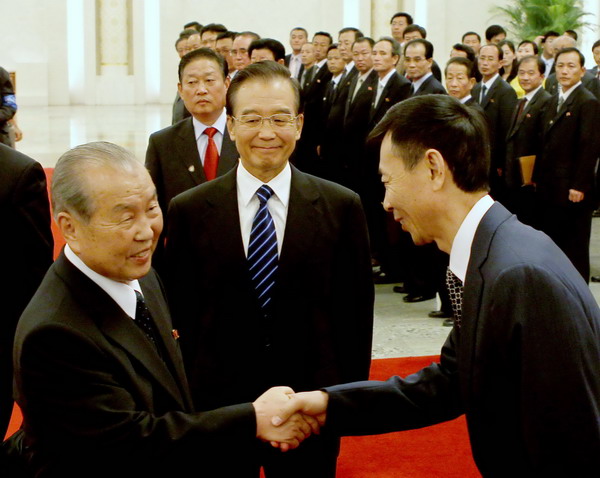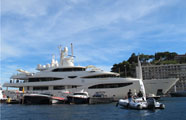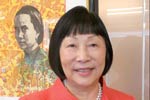Development path 'must suit DPRK'
Updated: 2011-09-27 07:47
By Qin Jize, Li Xiaokun and Zheng Yangpeng (China Daily)
|
|||||||||
|
 DPRK Prime Minister Choe Yong-rim (left) meets officials at a welcoming ceremony in the presence of Premier Wen Jiabao in the Great Hall of the People in Beijing on Monday. [Photo by Wu Zhiyi/China Daily]
|
BEIJING - China encouraged the Democratic People's Republic of Korea (DPRK) to follow a development path that best suits its situation and vowed to provide whatever help it was capable of, as Premier Wen Jiabao welcomed his Pyongyang counterpart on Monday at the start of a five-day visit.
Beijing hopes that a well-planned development path will help stabilize Pyongyang's economy and encourage peaceful engagement in the region, analysts said.
Wen told Choe Yong-rim, the DPRK prime minister, that Beijing wants to strengthen exchanges with Pyongyang, according to a release issued by the Foreign Ministry after their meeting at the Great Hall of the People.
"China supports the DPRK in exploring development that fits its own situation and will continue providing help within our capability," Wen said.
Choe's visit follows an agreement by the two countries in June to establish development zones along their border.
Wen said economic cooperation should be "government-guided, enterprise-based and market-oriented", adding Beijing also wants to deepen strategic exchanges with Pyongyang and protect joint interests.
Choe thanked China for its long-term support, saying building closer ties with China is a foundation of Pyongyang's policies.
Accompanied by a number of high-ranking business officials, Choe is scheduled to meet President Hu Jintao on Tuesday.
Choe became prime minister in June 2010.
He visited Northeast China in November and toured high-tech and pharmaceutical companies.
Zhang Liangui, a professor at the Research Institute for International Strategic Studies, which is affiliated to the Party School of the Central Committee of the CPC, noted that Choe has special responsibility for economic management.
The DPRK's economic ties with China have grown increasingly important as statistics from the Republic of Korea's (ROK) Unification Ministry showed that China now accounts for 57 percent of the DPRK's foreign trade.
Zhang said economic development is one of the most urgent tasks for the DPRK.
Wang Junsheng, a researcher with the Asia-Pacific studies office at the Chinese Academy of Social Sciences, said China is the main provider of DPRK's energy and food. However, Beijing has long been eager to help its neighbor through cooperation in technology and management rather than direct assistance, Wang said.
Choe is scheduled to visit several companies and factories in the commercial hub of Shanghai and the wealthy eastern province of Jiangsu.
China wants Pyongyang to understand and implement Chinese-style economic reforms, Wang said.
The two premiers also touched on efforts to revive the long-stalled Six-Party Talks, aimed at the denuclearization of the Korean Peninsula.
"China hopes that all sides remain in contact and in talks and improve relations so as to resume Six-Party Talks at an early date," Wen said.
Choe reiterated comments made by Pyongyang's top nuclear envoy who said in Beijing last week, during a meeting with Seoul's nuclear negotiator, that Pyongyang insists on restarting the talks with no preconditions.
ROK, US and Japanese officials, however, have said that before restarting the talks the DPRK must first adopt a number of measures, including ending its uranium enrichment program.










